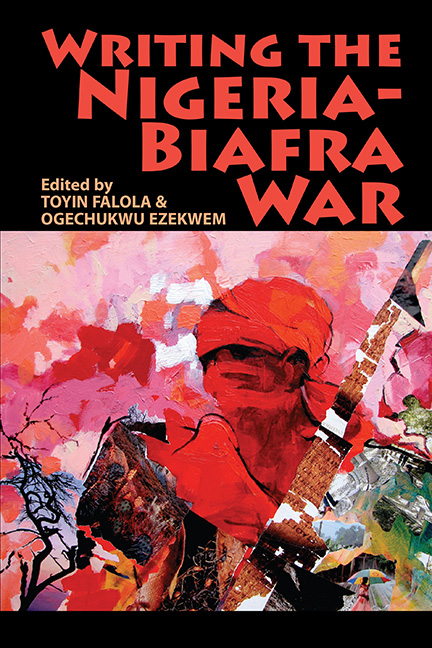Book contents
- Frontmatter
- Contents
- Notes on Contributors
- List of Abbreviations
- Timeline
- Map of Biafra 30 May 1967 – 1 May 1969
- 1 Scholarly Trends, Issues, and Themes: Introduction
- Part I On The History Of The Nigeria-Biafra War
- Part II Critical Debates On The Nigerian Crisis
- Part III The War In Fiction, Memoir, And Imagination
- Part IV Locating Gender In Nigeria-Biafra War Literature
- Select Bibliography
- Index
20 - What is the Country? Reimagining National Space in Women’s Writing on the Biafran War
Published online by Cambridge University Press: 17 June 2021
- Frontmatter
- Contents
- Notes on Contributors
- List of Abbreviations
- Timeline
- Map of Biafra 30 May 1967 – 1 May 1969
- 1 Scholarly Trends, Issues, and Themes: Introduction
- Part I On The History Of The Nigeria-Biafra War
- Part II Critical Debates On The Nigerian Crisis
- Part III The War In Fiction, Memoir, And Imagination
- Part IV Locating Gender In Nigeria-Biafra War Literature
- Select Bibliography
- Index
Summary
We are judged by the stories we tell.
But only the dead know the true stories;
they who speak to us, deaf that we are,
in signs and ellipsis.
(from ‘A Biafran War Survivor Remembers Africans Who Did Not Survive’, in Four Decades of Silence, by Chielozona Eze)Part 1: Overview
Writing, history, memory
As the benefit of hindsight has revealed, the Nigerian Civil War was to become the very sign of post-Independence African wars, from the invasion of Uganda by Tanzania in 1978–1979, to conflicts, whether brief or long-drawn-out, in Sudan, Somalia, Eritrea, Ethiopia, Liberia, Sierra Leone, Côte d’Ivoire, Rwanda, and Zimbabwe, and as a tropological prefiguring of today's situation in the Niger Delta. Occurring when they did, so soon after Nigerian Independence in 1960, the secession of Biafra and the subsequent civil war signified the shaky foundation of the nation-state in ex-colonial Africa, the potential for ethnic discord, competition over resources and the quest for power on the part of the new elites. Women have played a part in all these wars, both as fighters (including child soldiers) and, in some rare instances, as leaders, but to a far-greater extent as providers of army supplies, traders and producers of food, nurses, relief organizers, protectors of the weak and ensurers of collective survival. In the case of Biafra, although their role was predominantly non-combative (reflecting, no doubt, the gender politics of the time), the burden of suffering was none the less for that. This suffering is a strong thematic link in women's war narratives, whether of the immediate post-war period or those which have emerged from what is now called the Third Generation of Nigerian writers. These narratives, moreover, depending as they do on personal and collective memory, are inevitably marked by trauma, which notoriously leads to both obsessive repetition and to repression, effects which may impede memory. If the Civil War constitutes ‘the wound that speaks’ in Nigeria's construction of itself as an independent state, how do women's narratives of the Civil War negotiate questions of memory, trauma, memorializing and forgetting?
Contemporary research on post-conflict trauma emphasizes the importance of memory, both individual and collective, as the basis for narrativizing the past:
Collective memory is thus a socially constructed representation of the past that is shared by members of a group, such as a generation or nation-state, and thus marked by power relationships …
- Type
- Chapter
- Information
- Writing the Nigeria-Biafra War , pp. 423 - 453Publisher: Boydell & BrewerPrint publication year: 2016



